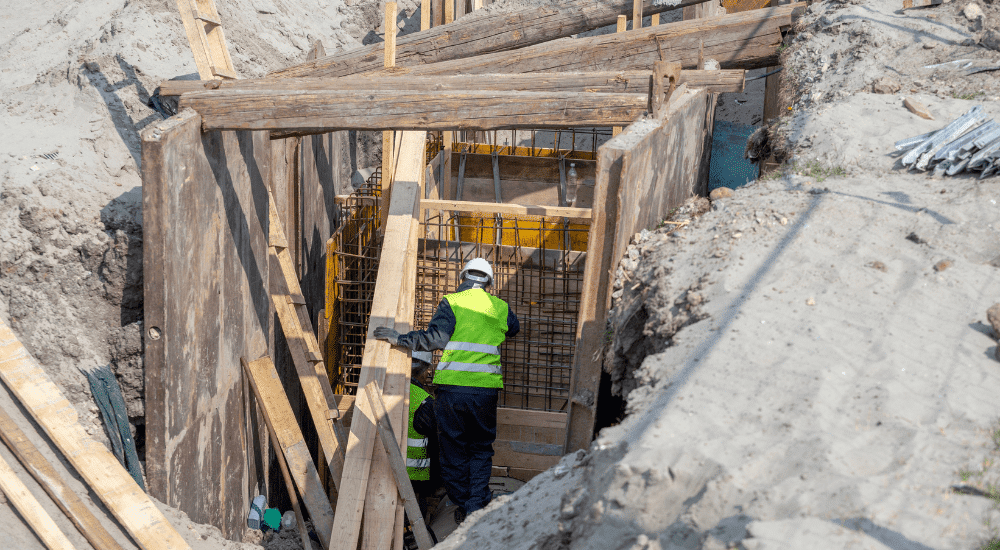How Trenches Collapse and How To Avoid It
 For many construction projects, excavation and trench work is an absolute necessity. Trenches are commonly dug out near construction sites to run cables, pipes, and equipment underground and beneath buildings. For a dug-out area to be considered a trench, its depth has to be as large as its width.
For many construction projects, excavation and trench work is an absolute necessity. Trenches are commonly dug out near construction sites to run cables, pipes, and equipment underground and beneath buildings. For a dug-out area to be considered a trench, its depth has to be as large as its width.
It may be fair to describe trenches as a “necessary evil” since they are known to be extremely dangerous. Trench collapses have a reputation for causing significant bodily harm or loss of life. For example, fatalities are twice as likely in trenches when compared to other areas at a construction site.
Overview of Trench Collapses and How They Happen
Trench collapses are considered to be some of the most dangerous types of construction accidents. When safeguards are not used to prevent a trench collapse, workers can be seriously harmed or even buried alive. Trench collapses and cave-ins are known to be caused by the following.
Equipment Issues
Trench collapses could be caused by poorly maintained and/or malfunctioning equipment such as:
- Backhoes;
- Boom trucks;
- Bucket trucks;
- Cement mixers;
- Compressors
- Digger derricks;
- Earth tampers;
- Jackhammers;
- Old air hammers;
- Picks;
- Shovels; and/or
- Surveying equipment
Flooding
Obviously, a major flood running through a trench site is extremely likely to cause the floor to become unstable. This would cause the walls to cave in and collapse.
Improper Sloping
When a trench is not sloped properly, it increases the significant risk of instability and potential collapse of the trench walls.
Negligence
Employer negligence is one reason trenches collapse. Examples of negligence include not conducting necessary safety training, failing to do necessary repairs, or not providing personal protective equipment (PPE). In deep trenches, for example, workers should wear a harness and lifeline.
Unstable Soil
The soil involved could very well be a factor in increasing the risk of a collapse. It is critical to engage in proper soil testing before excavation and at various times throughout the project. This will ensure the soil will be stable enough to support the work safely.
Injuries Caused By Trench Collapses And Cave-Ins
Trench collapses can result in an array of significant, debilitating, and potentially life-altering bodily injuries, including:
- Brain damage (e.g., traumatic brain injury);
- Broken bones;
- Lacerations;
- Lost limbs;
- Nerve damage;
- Paralysis and spinal cord injuries; and/or
- Wrongful death
Trench collapse accidents are notorious for resulting in significant, life-altering bodily injuries. Many trench collapse injuries could potentially lead to lifelong disabilities that may prevent injured workers from returning to their profession and no longer retaining the ability to earn a livelihood as a construction worker.
Determining Liability in a Trench Collapse
There are a number of entities or third parties that could potentially be held responsible for causing a trench collapse accident. In instances where the evidence indicates a party, or parties (other than employers), cause a trenching accident, then an injured worker would likely have the legal basis to pursue a personal injury lawsuit against the individual or entity who caused the accident and subsequent bodily injuries.
Third parties that could potentially be deemed liable (i.e. another way of saying responsible) for a trench collapse accident include:
- Architects and designers on the project;
- Construction companies;
- Engineers;
- General contractors and subcontractors;
- Independent contractors;
- Manufacturers of defective parts or components that cause a trenching accident;
- Property owners; and/or
- Utility companies
Establishing Fault in a Trench Collapse Injury Claim
Determining which party, or parties, is at fault for the trench collapse accident is necessary for a trench collapse injury claim. Once you hire an attorney with Slack Davis Sanger, they will go to work and investigate the underlying cause of the trench collapse accident to determine who was at fault for causing the accident and whose negligence caused your harms and losses.
Damages That Can Be Pursued in a Trench Collapse Accident Claim
If you file a trench collapse accident claim, you may be able to pursue the following forms of financial restitution for your harms and losses:
- Reimbursement for medical expenses;
- Reimbursement for lost wages;
- Compensatory damages for diminished or lost earning capacity;
- Pain and suffering; or
- Funeral and burial expenses (in the context of a wrongful death)
Safety Measures that Can be Put in Place to Help Prevent a Trench Collapse
Simple safety measures—such as proper engineering, construction practices, and safety protocols—can dramatically reduce the risk of a trench collapse. There are protective systems that can be utilized to prevent cave-ins.
For example, it is possible to slope, shore, and/or shield a trench. Sloping involves cutting a trench wall at an angle away from the trench. Shoring involves placing wooden or metal supports against the trench wall to prevent cave-ins. Finally, shielding entails the use of a metal box that fits inside the trench and is intended to protect workers if a collapse occurs.
In addition to the above-described safety measures, there are mandated safety protocols that worksites should follow set forth by OSHA, such as daily inspections of trenches. In addition, OSHA regulations stipulate that if conditions in the trench change to the point it becomes an existing or predictable hazard, then corrective measures need to be made to mitigate the safety risks.
This means that, if a trench collapse occurs, it is often the product of negligence.
Injured in a Trench Collapse? Speak to an Experienced Texas Personal Injury Lawyer
If you or a family member was seriously injured in a trench collapse, contact Slack Davis Sanger. Our team of trench collapse accident injury attorneys understand the nuances of the Texas civil justice system and will work tirelessly to obtain the financial restitution you are rightfully owed. To schedule a free, confidential consultation at one of our offices in Austin, Dallas, or Fort Worth, please call 800-455-8686 or fill out a quick contact form.

The firm handles cases involving catastrophic personal injuries and deaths. Our work spans three decades of handling airplane and helicopter crashes, truck and car accidents, oilfield and construction accidents, and other devastating accidents. We try lawsuits throughout the country in both federal and state courts and have recovered hundreds of millions of dollars for our clients. To date, we have handled or tried cases in 47 states, read more about our attorneys and firm.
